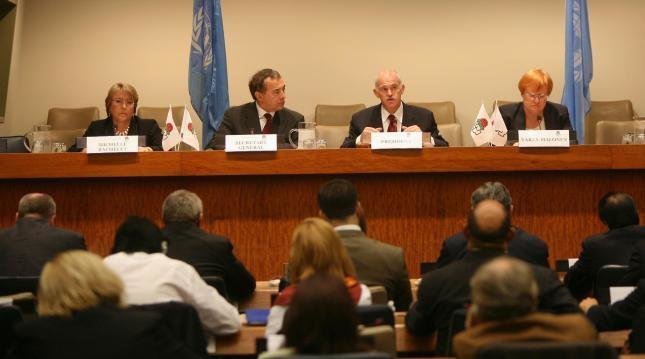Socialist International leaders address global financial crisis in meeting at United Nations
26 September 2008

Tackling the global financial crisis was the central concern at the Socialist International Presidium meeting, which counted with the participation of a number of Heads of State and Government and Heads of United Nations agencies, held at the United Nations headquarters in New York on 26 September on the occasion of the 63rd session of the UN General Assembly.
H.E. Michelle Bachelet, President of Chile; H.E. Jalal Talabani, President of Iraq; Alfred Gusenbauer, Chancellor of Austria, all three Vice-Presidents of the International, took part in this first meeting of the Presidium elected at the XXIII Congress of the International, as well as H.E. Tarja Halonen, President of Finland; H.E. Martin Torrijos, President of Panama; H.E. Boris Tadic, President of Serbia and Sanjaagiin Bayar, Prime Minister of Mongolia, as invited guests.
President of the Socialist International George Papandreou, opened the proceedings of the Presidium which included Luis Ayala, Secretary General of the Socialist International, alongside other elected Vice-Presidents as follows: Pascal Affi N’Guessan, President of the Ivorian Popular Front, FPI, Côte d'Ivoire; Ramón Alburquerque, President of the Dominican Revolutionary Party, PRD, Dominican Republic; Victor Benoît, Leader of the Union of Haitian Social Democrats; Nouzha Chekrouni, Socialist Union of Popular Forces, USFP, Morocco; Sher Bahadur Deuba, Nepali Congress Party; Massimo D’Alema, Democrats of the Left, DS, Italy; Elio Di Rupo, Chair of the Socialist Party, PS, Belgium; Mirjana Feric-Vac, Social Democratic Party, SDP, Croatia; Eero Heinäluoma, Finnish Social Democratic Party, SDP; Chantal Kambiwa, Social Democratic Front, SDF, Cameroon; Manuel Laguarda, Socialist Party of Uruguay, PSU; Juliao Mateus Paulo, Secretary General of the MPLA, Angola; Beatriz Paredes, President of the Institutional Revolutionary Party, PRI, Mexico; Mona Sahlin, Chair of the Swedish Social Democratic Party, SAP; Radmila Sekerinska, Social Democratic Union of Macedonia, SDUM, FYR Macedonia; Maria Titizian, ARF Armenian Socialist Party; Ousmane Tanor Dieng, Secretary General of the Socialist Party of Senegal, PS; Poul Nyrup Rasmussen, President of the Party of European Socialists, PES; Pia Locatelli, President of Socialist International Women, SIW; and Jacinda Ardern, President of the International Union of Socialist Youth, IUSY.
Invited guests from the United Nations introducing the debate on the urgent financial situation were Juan Somavía, Director-General of the International Labour Organisation (ILO); Kemal Dervis, Administrator of the United Nations Development Programme (UNDP); and Alicia Bárcena, Executive Secretary of the Economic Commission for Latin America and the Caribbean (CEPAL).
The Presidium’s discussions highlighted the magnitude and extent of the financial crisis, stressing that the warning signs of such global vulnerability had been all too evident in a model based on irresponsible economic greed combined with poor political management and regulation. The members of the Presidium in their exchanges urged a move away from societies based solely on money creating money and a return to real and sound economies. Participants emphasised the need for clear and transparent financial rules and called for the establishment of a World Financial Organisation to strengthen international regulation and accountability. Equally they were unanimous that the progressive response had to take an integrated approach, with financial, economic, social and environmental concerns given the same importance.
Today’s worldwide financial instability, the meeting highlighted, should not detract from achieving the targets set by the Millennium Development Goals (MDGs) and calls were made for concrete results to be produced at the forthcoming Financing for Development Conference to be held in Qatar as the international community was in danger of regressing on tackling poverty and redressing global inequities.
All present were in agreement that the situation today represented not an era of change, but a change of an era, and as such represented a defining moment for social democratic forces to clearly define a new paradigm and real solutions. To this end, the Presidium decided to establish a Socialist International Commission on Global Financial Issues to present clear and timely guidelines and a roadmap for a way out of the crisis. A statement was issued reflecting the different elements agreed in the discussions.
The Presidium also addressed some other issues of current concern, including a report by the Prime Minister of Mongolia on his country’s ending of the electoral impasse following recent legislative polls; an account of the dramatic effects of the unprecedented four hurricanes which had swept through Haiti from Vice-President Victor Benoit; an overview of the current political situation in Serbia by President Boris Tadic; a perspective on the situation in the South Caucasus following the crisis there by Vice-President Maria Titizian; and a presentation by Vice-President Pascal Affi N’Guessan on the political framework before elections to be held in Côte d’Ivoire to consolidate the peace process there.
The Presidium members also exchanged views on the tasks and priorities for the International. The Presidium agreed to make the meeting in conjunction with the United Nations General Assembly an annual event in the future and to hold the next Council meeting hosted by the Mexican member parties in their country this 17-18 November to discuss an agenda with the urgent world financial situation at its centre, following US elections.
